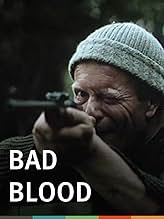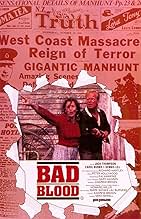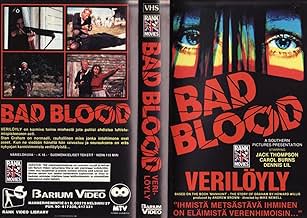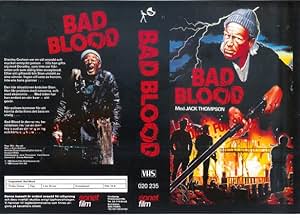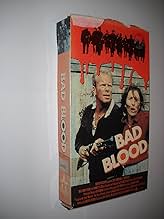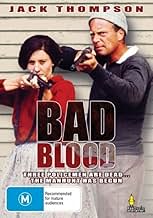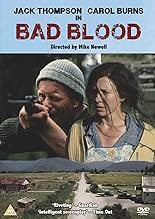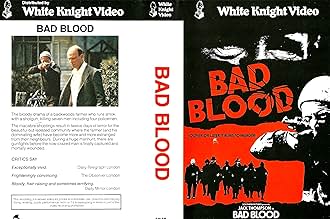Bad Blood
- 1981
- Tous publics
- 1h 45min
NOTE IMDb
6,5/10
461
MA NOTE
Ajouter une intrigue dans votre langueDuring World War 2, a farmer in New Zealand murders seven people, and the police, along with local Maori trackers, hunt him in the bush country.During World War 2, a farmer in New Zealand murders seven people, and the police, along with local Maori trackers, hunt him in the bush country.During World War 2, a farmer in New Zealand murders seven people, and the police, along with local Maori trackers, hunt him in the bush country.
- Réalisation
- Scénario
- Casting principal
Alan Jervis Wilks
- Ralph Frederic
- (as Alan Jervis)
Avis à la une
Admittedly the title sounds like it's stolen from a lousy and cheesy 80's B-slasher movie, but "Bad Blood" is one of the most hauntingly dramatic depictions of a real-life human tragedy ever made. Set in New Zealand in 1938 and revolving on painful facts as they occurred there, "Bad Blood" tells the story of Stanley Graham and his wife Dorothy. They're outcasts in the small village community because of their rude and asocial behavior and the accumulation of financial problems slowly drives them to insanity. Stanley nearly has to go to prison for refusing to turn in his riffles and the woeful regards of the townsfolk become more and more hostile when the Grahams accuse them of poisoning their cattle. The script slowly and atmospherically builds up towards the inevitable tragedy of Stanley going irreversibly berserk and butchering seven people during a nightmarish rampage. This beautiful period piece, with marvelous costumes and set pieces, draws a mesmerizing portrait of human paranoia and despair. It also frighteningly illustrates how quickly a chain of little and seemingly insignificant events can escalate into a bloodbath, and that's truly disturbing to say the least. The sober music and gloomy photography epitomize the depressing tone of the film and Jack Thompson gives away one of the most perplexing performances I've ever seen. He should have received awards for his role, and the film in general as well for that matter. Carol Burns is equally amazing as his Dot, who may not have killed anyone but who's at least as dangerous as her husband, if not more. The climax sequences, revolving on the extended manhunt for Stanley after he fled into the open country, are also very gripping and effectively revealing the monstrous nature of people. Suddenly, the little town is overrun with people carrying riffles, most of them even unaware of the details of what happened exactly, simply to join the vigilante hunt for Stanley. No less than Mike Newell directed this sadly obscure little gem back in 1981. Nowadays he's an acclaimed director of slightly more light-headed films, like "Four Weddings and a Funeral", "Love in the Times of Cholera" and "Mona Lisa Smile". The fact that Newell was born and raised in England makes it even more admirable how he's capable of reflecting the typical New Zealand characters, culture and WWII background. I'm not aware of "Bad Blood" being available on DVD now, but the day it comes out make sure you grab a copy of this tense masterpiece. I certainly will.
Watching BAD BLOOD today, one is immediately struck by the similarities between the look, feel, and story of the movie and the contemporary FIRST BLOOD. Both films feature loner heroes who fall foul of polite society and then are forced into becoming fugitives. The difference between them is that FIRST BLOOD is a crowd-pleasing fantasy whereas BAD BLOOD is a brutal true story with all too depressing plot ingredients.
The stunning New Zealand locations are some of the best things about this atmospheric and engaging story. It tells of a rural farmer who snaps when the local authorities show up to confiscate his rifles (they need them for the war effort, the film being set during WW2). Murder and a manhunt ensue, all of it directed well by British director Mike Newell (HARRY POTTER AND THE GOBLET OF FIRE).
The emphasis of the film throughout is on realism and the naturalistic performances of the actors enhance the effect. There are some truly jaw-dropping moments to be found here and it's clear that Newell is doing everything in his power to avoid sentimentalising the story, instead sticking to the cold, hard facts. I found the downbeat nature of the production a little too strong for this to be a film you can really enjoy, but it's nonetheless a strong and vivid slice of film-making, and highly memorable with it.
The stunning New Zealand locations are some of the best things about this atmospheric and engaging story. It tells of a rural farmer who snaps when the local authorities show up to confiscate his rifles (they need them for the war effort, the film being set during WW2). Murder and a manhunt ensue, all of it directed well by British director Mike Newell (HARRY POTTER AND THE GOBLET OF FIRE).
The emphasis of the film throughout is on realism and the naturalistic performances of the actors enhance the effect. There are some truly jaw-dropping moments to be found here and it's clear that Newell is doing everything in his power to avoid sentimentalising the story, instead sticking to the cold, hard facts. I found the downbeat nature of the production a little too strong for this to be a film you can really enjoy, but it's nonetheless a strong and vivid slice of film-making, and highly memorable with it.
True story set in a farming community in New Zealand during WW2 where the government decrees that all firearms must be collected by the police. However when the police approach increasingly paranoid, broke and struggling to keep his family fed Stan Graham's (Jack Thompson) he refuses to hand his weapon over and ends up killing seven people including a number of policemen. He is then subject to one of the biggest manhunt's in New Zealand's history.
Whilst certainly gritty and brutal with Stan depicted as a simple, but ruthless killer, you do feel a degree of sympathy for him and his wife as they are left with nothing and facing a bleak future. The local townsfolk are none too bright either, generally disliking the family and treating the hunt as a giant jolly never seemingly understanding what they have on their hands. The case became a considerable cause celebre and political hot potato in New Zealand as in some parts Stan was viewed as a hero in such socially troubling times. Quite excellent performances from Thompson and Carol Burns as his supportive but equally crazed wife, this is now rightly seen as a New Zealand classic.
Whilst certainly gritty and brutal with Stan depicted as a simple, but ruthless killer, you do feel a degree of sympathy for him and his wife as they are left with nothing and facing a bleak future. The local townsfolk are none too bright either, generally disliking the family and treating the hunt as a giant jolly never seemingly understanding what they have on their hands. The case became a considerable cause celebre and political hot potato in New Zealand as in some parts Stan was viewed as a hero in such socially troubling times. Quite excellent performances from Thompson and Carol Burns as his supportive but equally crazed wife, this is now rightly seen as a New Zealand classic.
This movie is boring and dumb. It is boring because they didn't take their time making it. They weren't thinking clearly. Nothing happens for the first hour. And then the wife shouts "POISONDOG" and then nothing happens for the rest of the movie. If you're a fan of the phrase "POISONDOG" or other phrases like that, or Jack Thompson II films, then check out the glory that is... Bad Blood! Otherwise avoid like plague. International. 2000.
Hollywood made Stallone's First Blood, which spawned a slew of profitable sequels. This simple film is First Blood lite, New Zealand Style. It is difficult to find a protagonist or antagonist in this film. Some will root for Stanley Graham and his family, while others will see them as obviously insane and in need of removal from society. This real life event was tragic for eight families. The seven that lost a loved one, and the one that lost its husband and father. There is also a question about the involvement of the wife in this film, beautifully played by an unknown New Zealand actress. The tragedy of the film is arrogance and insensitivity. The authorities of the village seem arrogant and insensitive to the plight of the wife and children of this disturbed man, And there is a good case that the wife was also disturbed. And what about these two poor children? I guess they wound up in social services. After a slow start and without the benefit of translation and subtitles of New Zealander language, the film kicks into high gear. New Zealand, at times, and in most places, is almost like heaven on earth. But at other times, it can descend into hell on earth. So too, are the people in this story; caught somewhere between heaven and hell. A riviting story worth watching.
Le saviez-vous
- AnecdotesActors playing shot policemen, who had to lie on the floor in pools of blood for long periods of time, to relieve the boredom, would sing and whistle the Monty Python song "Always Look on the Bright Side of Life", which had been at the time recently popularized in the movie Monty Python : La Vie de Brian (1979).
Meilleurs choix
Connectez-vous pour évaluer et suivre la liste de favoris afin de recevoir des recommandations personnalisées
Détails
- Date de sortie
- Pays d’origine
- Langue
- Aussi connu sous le nom de
- The Shooting
- Lieux de tournage
- Nouvelle-Zélande(filmed entirely on location in)
- Sociétés de production
- Voir plus de crédits d'entreprise sur IMDbPro
- Durée
- 1h 45min(105 min)
- Couleur
- Rapport de forme
- 1.85 : 1
Contribuer à cette page
Suggérer une modification ou ajouter du contenu manquant

